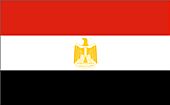Northwest Horticultural Council
Export Manual
EGYPT
 Capital: Cairo
Capital: CairoPopulation: 111,247,248 (2024)
Currency: Egyptian Pound
Official Language(s): Arabic
I. CHEMICAL MAXIMUM RESIDUE LEVELS (MRLs)
Please click on the above link for a list of chemical MRLs.
II. CHEMICALS AND ADDITIVE INFORMATION
A. Chemical residue standards:
Egypt defers to maximum residue levels established by the Codex Alimentarius Commission. If there is no Codex MRL, European Union MRLs will be used. If there is no established Codex or EU MRL, tolerances established by the United States will apply. In the absence of an MRL for a specific product, the MRL value for the nearest group of agricultural commodity or product shall be applied, in the same sequence as above.
B. Monitoring chemical residues:
Pesticide residues currently are monitored by the Central Agricultural Pesticides Laboratory, Ministry of Agriculture, Dokki, Giza, Egypt.
C. Restrictions on use of waxes:
None.
III. ORGANIC FRUIT REGULATIONS
No information.
IV. TARIFFS
The customs tariff on imported apples and pears is 40% of the CIF value. The cherry tariff is 10% of the CIF value. An additional 3% administration charge and a 1% tax is also assessed.
The tariff rate on U.S. apples is assessed based on a customs valuation of $700/ton.
Apples, pears, and cherries from the European Union enter Egypt duty-free under the Euro-Mediterranean Agreement (a free trade agreement).
V. NON-TARIFF BARRIERS
A. Labeling requirements:
Nature of product, commercial specifications (size, grade, kind), weight, country of origin, exporter and importer name, production and expiration dates must be listed.
According to the Egyptian General Organization for Export and Import Control (GOEIC). Fruit shipments must have a shelf life of one year from the date printed on the packing box and that shipment must arrive in Egypt with at least half of its shelf life remaining, i.e. six months. Therefore, the production date should refer to the date that product was packed. The expiration date should be one year following the production date.
Labels should be written in English and Arabic. There are no specific size or placement requirements for labels. The NHC recommends working closely with Egyptian importers to verify label content and wording.
B. Licenses and quotas:
Apple shipments must be accompanied by a certificate of origin.
C. Currency Issues:
Egypt’s central bank has instructed commercial banks not to provide letters of credit unless they have 100% cash coverage at opening.
D. Pest and plant disease restrictions:
An Import Permit (IP) and Phytosanitary Certificate (PC) are required.
For apples, an additional declaration must be on the PC and state “The apples in this shipment are certified in compliance with the U.S./Egypt Apple Work Plan.”
Apples must be inspected and found free of the following pests known to occur on apples in Idaho, Oregon and Washington: Quadraspidiotus perniciosus (San Jose scale), Anarsia lineatella (peach twig borer), Aphis pomi (green apple aphid), Erwinia amylovora (fireblight), Pseudococcus maritimus (grape mealybug), Cydia pomonella (codling moth), Eriosoma lanigerum (woolly apple aphid), Panonychus ulmi (European red mite) and Venturia inaequalis (apple scab). Of these pests, codling moth, European red mite, grape mealybug , wooly apple aphid, apple scald, peach twig borer and fireblight are known to occur in Egypt.
On March 19, 1997, a work plan for the export of apples from the U.S. to Egypt went into effect. This work plan resolves quarantine problems caused by dead insects which had been a cause of rejections in the past. Egypt will no longer reject shipments due to the presence of dead insects. The work plan requires that the fruit be subjected to a period of low-temperature storage. Commercially packed fruit for export would be considered to be in compliance because low-temperature storage is a normal and customary step in commercial apple post-harvest handling.
E. Other trade restrictions:
Shipments of apples, cherries, and pears require pre-shipment registration under the National Single Window for Foreign Trade Facilitation (Nafeza) system (https://www.nafeza.gov.eg/en). Both U.S. exporters and Egyptian importers must register with Nafeza to obtain unique identification numbers. After a Nafeza number is assigned both the importer and exporter will have access to training materials and the importer will be able to register an export shipment.
After Nafeza registration shipments may commence. The new Advance Cargo Information (ACI) system will be used to track individual shipments and requires importers to obtain an identification number for each shipment, called an Advanced Cargo Identification ID (ACID) number. Egyptian importers will apply for an ACID number and an automatic email will be sent to the U.S. exporter to provide shipment information – within 48 hours of export departure.
Exporters are encouraged to work with their Egyptian importers to provide the proper documents. Importers are required to submit all consignment documents for Egyptian agencies at port of entry including Customs, General Organization for Export and Import Control (GOEIC), National Food Safety Authority, and the Ministry of Agriculture’s Plant Quarantine and Veterinary Services must be through the Nafeza system 48 hours prior to shipment arrival.
VI. MARKETING REPRESENTATIVES FOR PACIFIC NORTHWEST TREE FRUIT INDUSTRY:
Washington Apple Commission:
Nina Halal
Arab Marketing & Finance Inc. (AMFI)
Beirut, Lebanon
Voice: 011-961-1 740378
Fax: 011-961-1-740393
E-mail: halal@cyberia.net.lb
Pear Bureau Northwest:
Simon Bakht
Arab Marketing & Finance Inc. (AMFI)
Beirut, Lebanon
Voice: 011-961-1 740378
Fax: 011-961-1-740393
E-mail: amfime@cyberia.net.lb

